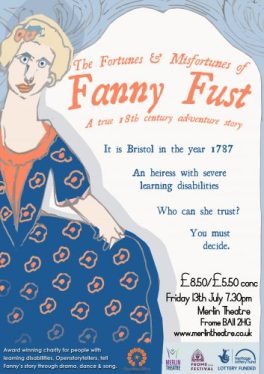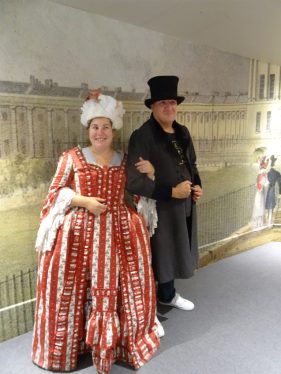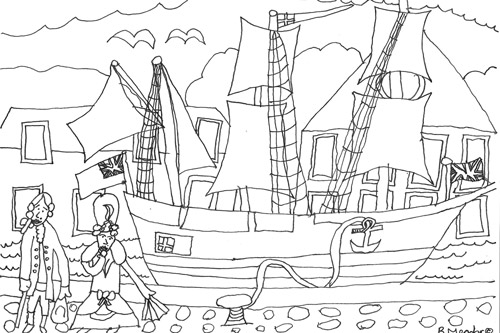Telling Stories about Learning Difficulties
Who was Fanny Fust and what can her life tell us about the experiences of people with learning difficulties in the 18th century? What conversations might such a history spark about disability and consent in the present day?

What did the project involve?
This project involved a collaboration between a historian, and English scholar, and a community arts charity supporting people with learning disabilities to explore questions of capacity and consent through the story of Fanny Fust, a wealthy heiress born in the 18th century. It addressed the following questions:
- Who was Fanny Fust and what can her life tell us about the experiences of people with learning difficulties in the 18th century? What conversations might such a history spark about disability and consent in the present day?
- What are the rewards and challenges of a research project co-produced by university researchers and people with learning difficulties? For disabled people, the barriers to involvement in knowledge production are often insurmountable. Placing their research agenda and accessibility requirements centre stage decentres the usual historical research process in fruitful and potentially illuminating ways.
- What is the potential of storytelling as a methodology for the communication of research? How might university researchers work with storytellers to reach new audiences, and to encourage audience engagement with their work?
The storytellers with learning disabilities worked in collaboration with historians to uncover this fascinating hidden history. In order to get a feel for what life was like for Fanny, OpenStoryTellers, working with the Bristol academics, investigated all aspects of 18th century life, including the fashion, the food, the leisure pursuits, architecture and schooling, visiting places including the Pump Rooms and the Fashion Museum in Bath.
They devised a theatre performance based on Fanny’s story and also engaged in the curation of music and songs inspired by the story. She was an heiress with severe learning disabilities. She was tricked by her friends and abducted by a fortune hunter. She was taken to France for marriage. The project believe her story raises questions as relevant today as they were in 1787. The performances were followed by a Q and A session focusing on the relevance of Fanny’s experience to the lives of disabled people today.
During the project Nicola Grove, the founder of OpenStoryTellers, stated: “Our show and talk will inform, make people think and entertain the audiences. Working with a steering group of professionals, participants will gain a deeper insight into this previously under-researched part of their history, as well as learning valuable new communication skills to use to bring Fanny’s thought-provoking story to life”
Who are the team and what do they bring?
- Josie McLellan (History, University of Bristol) is a social and cultural historian, with particular research interests in public history and the co-production of research with people outside the university.
- John McTague (English, University of Bristol) interests are in literature and politics in the late-Stuart and Hanoverian periods, bibliography and the history of the book. His particular interests are restoration and early eighteenth-century literature and political culture; the history of historiography, particularly forms of historical writing outside of the neo-classical mode.
- Nicola Grove (Founder, OpenStoryTellers) spent many years as a Speech & Language Therapist and is now a storyteller, researcher and trainer. She has authored several books and papers on narrative and disability.
- OpenStoryTellers is a community arts charity supporting and co-run by people with learning disabilities. Their aim is to help people to find their voice and use it. Because they believe stories are what make us human. It was founded in 2004, when Speech Therapist Dr. Nicola Grove found that supporting people with learning disabilities to share stories helped build relationships and challenge exclusion.
What were the results?


The official flyer for ‘The Fortunes and Misfortunes of Fanny Fust’ and two OST actors after a performance.
You can read and listen to an interview with OpenStoryTellers on the BBC News Website. OpenStoryTellers have also made a lovely 20 minute film which you can see below, illustrating the journey of researching, documenting and dramatising the story of Fanny Fust.

An artistic interpretation of Fanny’s abduction by Robin Meader of Openstorytellers.
The National Lottery Heritage Fund, who also funded this project, have shared a video with members of OpenStoryTellers discussing the experience of the project.
OpenStoryTellers also released an Official Trailer for the performance.
The performance ‘The Fortunes and Misfortunes of Fanny Fust’ was reviewed by an article in the Frome Times and the research project was explored in an article published by The University of Bristol.
An article was also published by UCL Press also entitled ‘The Fortunes and Misfortunes of Fanny Fust’, co-written by the company of OpenStoryTellers, Nicola Grove, Simon Jarrett, Josie McLellan & John McTague. It goes into much detail over the foundation and many developments that occurred during this project.


Project Social Media